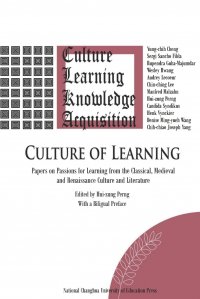In literature, culture, history, philosophy and arts of classical and Renaissance Europe, a certain thematic event can probably be traced through how people learned to cope with life, read, accumulate cultural capitals, fight ideologies, become smart, and turn into a happy man, a real human being. In this volume, the path our authors have taken is as versatile as life can have been. Exactly how people learned and what subjects appeared to them as having most powerful impact on material and spiritual life? We follow contemporary theory of cultural studies, find traces and grafts from texts, cover as many materials as possible, and earnestly deal with individual work and people. We hope to reach conclusions on how early European individuals tried to blend into and improve community life through private learnings. The joint effort is admirable in that petit histoire in educational study still has its superb edge: Compared with the self-sustaining vision in grand historical scholarship, our voice is perhaps more refined, allowing more space for intimacy. And it is perhaps more accommodating, more tolerant. We can fall in love with how it may sound, as if it comes from the whispering gallery of Derridean workshop of material reality, dialectical truth, and Foucault’s effective history. Это и многое другое вы найдете в книге Culture of Learning (NCUE, 國立彰化師範大學)
Culture of Learning NCUE, 國立彰化師範大學
Подробная информация о книге «Culture of Learning NCUE, 國立彰化師範大學». Сайт не предоставляет возможности читать онлайн или скачать бесплатно книгу «Culture of Learning NCUE, 國立彰化師範大學»
